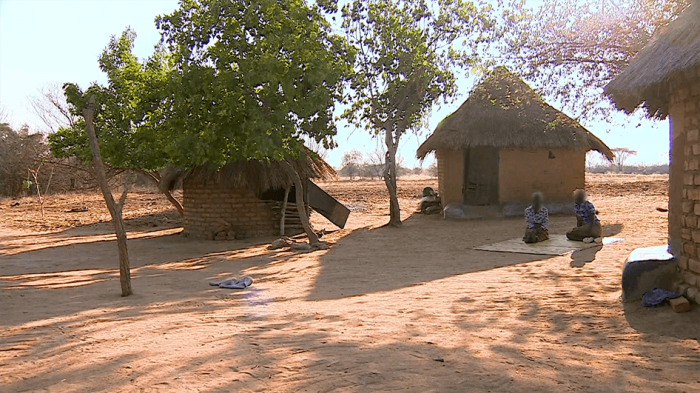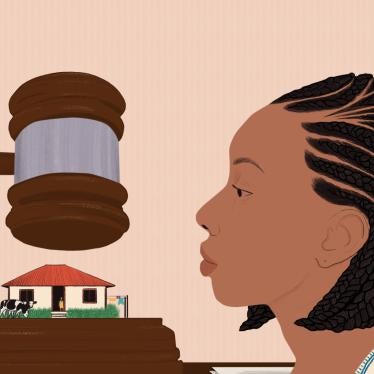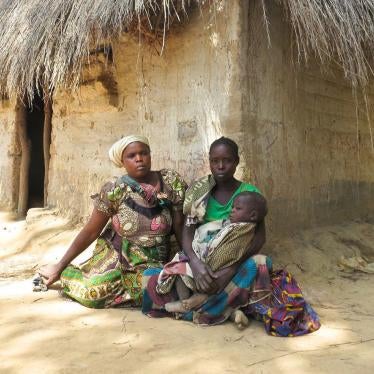“Before my husband was even buried, my brother-in-law was making moves [to take over my property]…,” a widow living in a homestead outside Bulawayo with her three children told me, “I only realised about three weeks later that I was being left out.”
She is not alone in this experience. We interviewed more than 60 widows from throughout Zimbabwe and found that in many cases, their inlaws would claim all of their property and resources after their husbands died, in many cases leaving them homeless, landless, and penniless.
This is a silent epidemic of genderbased violence. And the results can be catastrophic.
Read a text description of this video
Widows of brothers
They [our in-laws] took over large portions of our land. Every day they threaten us, telling us that as widows we have no right to the land and that we should leave.
Bethany Brown
Researcher
Human Rights Watch
Around the world, millions of older women and older people generally, routinely experience violations of their human rights. Each year, thousands of widows across Zimababwe have their property grabbed by their husband’s relatives. They lose their homes, they lose their fields, they lose everything.
Maliyaziwa Malunga
Widow who lost property to in-laws
They take all the goods we are using with my husband, even cars, properties. They left me with nothing. //A marriage certificate offers protection sometimes, obviously.
Bethany Brown
Researcher
Human Rights Watch
A widow would need to prove that she was married in order to be able to fend off relatives’ property grabbing in courts. Estimates are that up to 70% of marriages in Zimbabwe are unregistered, customary law unions.
Slyvia Chirawu
National Coordinator
Women and Law in Southern Africa
Research and Education Trust (WLSA)
Imagine the process a woman that doesn’t have a marriage certificate has to go through. She has to go to the court, convince the court that she was married. And sometimes even if she might have five, six children, the relatives turn around and say she wasn’t married.
Priscilla Misihairabwi-Mushonga
Widow & Member of Parliament
An African marriage has always been understood as a communal marriage. It used to work when it was being understood if the husband dies, what the other family members are doing in coming in and taking responsibility //however that has now been changed because of greed because of the general changes that have happened in society.
Widows of Brothers
If our husbands were alive, they [the in-laws] would not do what they are doing. This harassment is happening because our husbands died.
Bethany Brown
Researcher
Human Rights Watch
If a widow overcomes that initial hurdle overcomes of getting herself to court, she still will face the struggle to be able to pay for transportation and court fees.
Lucia Masuka Zanhi
Legal Resources Foundation
The court fees also, they’re a challenge and I know authorities will say but perhaps for some cases it is just $5 or it’s a dollar. But for the groups that we’re talking about, the groups that we interact with, the rural population and even some of those who are in the urban areas, they are not able to raise the $1 or the $5 that we’re talking about so I think it’s one area again that then hinders access to justice.
Bob Isaiah Muchadya Dzere
Nhaka African Worldview Trust, NGO for widow’s rights
We have to advocate, that this has to stop. // I think much more work should be done to do outreach work, advocacy so that the people are conscious about it, they’re educated about it. If my wife becomes a widow, I want her to miss my presence only. Not any other thing. She must have all the property with her and I am taking care that the property is not grabbed away from her. The registration of the house and the car it’s under her name.
Bethany Brown
Researcher
Human Rights Watch
Widows in Zimbabwe need to have access to information about their rights to property. They need to know about ways that they can defend their property through the court system if someone tries to grab it from them. And the government needs to make registration available for marriages of all types.
Widows of brothers:
It’s hard to be subjected to this kind of suffering when your husband dies.
Many widows lose everything they have worked for. Their children may have to drop out of school.
They depend on the charity of others when they used to be standing on their own two feet, staying with relatives, trying to find income opportunities. Those who can still work must start from nothing, resulting in poverty that follows them for the rest of their lives.
Many other widows I spoke to from all over Zimbabwe during research for the Human Rights Watch report “You Will Get Nothing” on the rights of widows said that inlaws evicted them from their homes, and forced them off the lands they worked for their livelihoods.
This cuts off women’s economic empowerment at the root, by taking away the stability of a home and livelihood, on top of grief over the loss of a spouse.
Over 70 percent of women in Zimbabwe are involved in the agricultural economy.
The loss of a field is the loss of the most valuable incomegenerating asset most women have.
This happens to thousands of women each year in Zimbabwe.
Relatives move in when the woman is grieving and vulnerable. Many widows are older women who may not have the information or the financial resources they need to fight a husband’s family.
Many families claim that it is their right to take the family’s property under customary law. But it is greed, not culture, that drives this practice.
Property grabbing is a problem in other southern African countries as well. Botswana and South Africa have both taken legal steps to end the practice.
The introduction of the Marriages Bill is an opportunity for Zimbabwe to take practical legal steps, too. It should make registration available for marriages of all types.
Widows I spoke with who were in unregistered customary unions were the most vulnerable.
Courts ask their inlaws to verify their unions in court. Even if they know their rights, and get themselves to court, the widows are often at the mercy of their inlaws to confirm that they were married.
Women whose marriages were registered and who are able to get legal help still face challenges, but are more likely to be successful in the courts.
Bethel’s inlaws tried to use her unregistered status as leverage for a bribe from her.
She was fortunate to obtain free legal services from a local organisation to rebuff them, and keep her home.
Where the law does not protect, it should be amended so that it protects everyone.
As a Zimbabwean, I have been working on human rights for many years. It is time Zimbabweans started seeing widows differently.
Their equal property rights are not optional, nor is this a “family matter.” Zimbabwe should put a spotlight on widows’ rights.
Property grabbing violates women’s rights, harms children, and hinders development.
For the good of this country, Zimbabwe should seek to change laws and support widows, because they are entitled to the same rights as every other person here.









